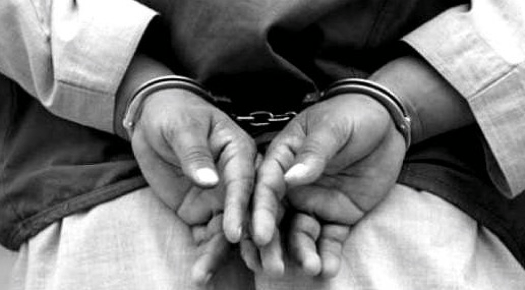
Police officials in Sargodha in Punjab Province, Pakistan, recently arrested a Christian man on grounds of blasphemy after it was discovered that he healed sickly people, including Muslims, by praying to God. British Pakistani Christian Association (BPCA) explained that the Christian man, Naveed John, was arrested after police officials recovered a sword featuring inscriptions of Quranic verses on the blade from his room. His family members told the human rights organization that they were asked to pay a bribe to the police if they wanted John’s release. Reportedly, the police accused John of having committed blasphemy after his family refused to pay the bribe. He has been languishing in prison since his arrest on October 8.
“The police First Incident Report states that police found a sword in Naveed's room inscribed with Kalma [Muslim proclamations]. It further states that a Christian should not be in possession of the Muslim sword and that knowledge of the sword in a Christian's possession could stir Muslims to violence,” the BPCA explained. “The sword has been described as a gift from a friend that Naveed kept simply to show courtesy and avoid offence. He made sure it was kept safe and appropriately on a mattress off the floor to prevent any offence to Muslims.”
The BPCA further explained that the motive behind John’s arrest was the fact that he prayed for sickly people who feared that they might have been possessed by demons. Some of his patients included Muslims, who after witnessing John’s miraculous healing abilities, decided to renounce their own faith and convert to Christianity. Growing numbers of such cases stirred communal tensions in the locality, with radical Islamists accusing John of having committed various crimes. John’s brother, Sakhawat Masih, told the BPCA that even before arresting him, the police had visited their house, demanding money in exchange for protection to the Christian family from a furious Muslim mob. The police had also warned that if the family did not pay, they would take action against John.
“Blasphemy laws are used to settle scores and are a mechanism to target Christians. Something must be done to change them,” said John's lawyer, Tahir Naveed Chaudhry. “Here we find another innocent young man accused of a crime that could cost him his life.”
In Pakistan, blasphemy laws are seemingly violated if any person expresses views that are offensive to the religion, adherents of the religion or Prophet Muhammad. Even though such cases are usually lodged against the country’s religious minorities by members of the majority Muslim faith, John’s blasphemy charge was initiated by the state police itself.
“This latest blasphemy allegation sets an awful precedent that police can now enact such cases on a whim after being denied a bribe [and] places Christians in a very dangerous position,” said BPCA officer Shamim Masih. “A thorough examination of this incident is required and a police review of their own practices. If not, I predict many more Christians are going to lose their lives to the draconian blasphemy laws.”
The BPCA has now launched a fundraising campaign to help John pay for his legal expenses, which would cost an estimated $600.
“I hold grave concerns about this most recent blasphemy arrest, state policing authorities are meant to protect the communities they serve, but something has been amiss in Pakistan from the outset of their establishment,” BPCA chairman Wilson Chowdhry said. “Bribery and corruption in Pakistan have demeaned their international status and is well documented regarding their police force. However, this latest act that has no doubt destroyed a young man's life is an alarming precedent that illustrates [that] the quality of lives for Christians in Pakistan has hit rock-bottom.”
Last year’s United States’ State Department report on International Religious Freedom, which was released on October 14, acknowledges how laws related to apostasy and blasphemy in countries like Pakistan, Saudi Arabia, Egypt and Sudan are often used to discriminate against religious minorities.
“The United States uniformly opposes such laws which are used to oppress those whose religious beliefs happen to offend the majority,” State Department Ambassador at-large for International Religious Liberty David Saperstein said. “The existence of such laws has been used in some countries as pretext to justify violence in the name of religion to create an atmosphere of impunity for those resorting to violence and/or leads to false claims of blasphemy.”
Photo Credits: Daily Pakistan
